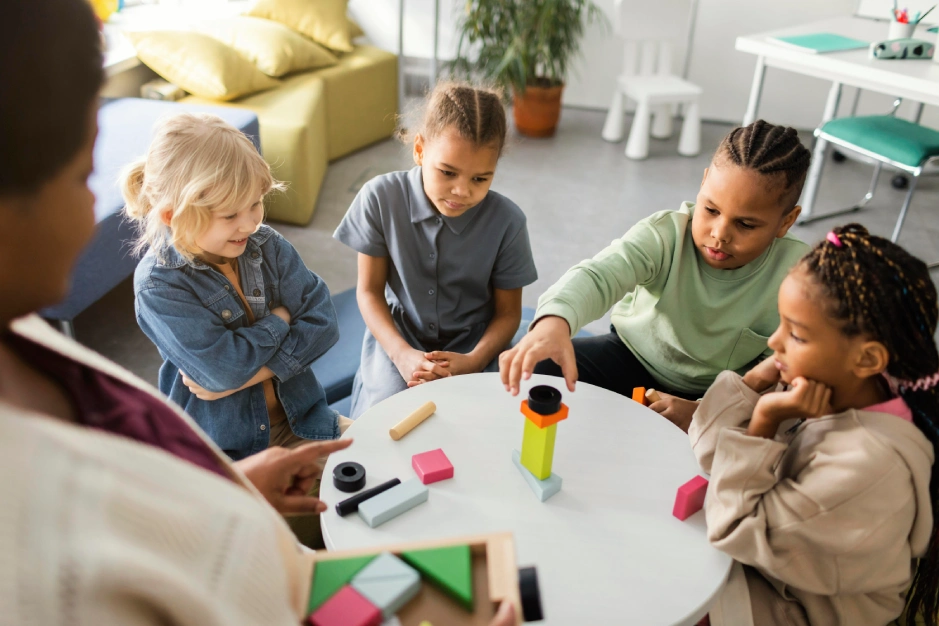School Readiness Program for Children with Autism & Developmental Delay
Bridging the path to mainstream school with confidence, support & inclusion
About the Program
At Act for Autism, our School Readiness Program is purpose‑built for children on the autism spectrum and those with developmental delays who are preparing to join mainstream (regular) school environments. Our mission is to equip children with the foundational skills, confidence, and tailored supports to thrive academically, socially, emotionally, and behaviorally in a school setting.
We blend evidence‑based interventions and strategies—drawing on applied behavior analysis (ABA), speech and language therapy, occupational therapy, social skills training, and executive function supports—to deliver a holistic preparation experience.
How Our School Readiness Program Supports Your Child
The transition into school is a critical developmental phase. Our program builds the essential skills, behaviors, and strategies children need before formal schooling:
- Strengthens communication, expressive and receptive
- Cultivates social and peer interaction skills
- Teaches regulation and coping with sensory demands
- Introduces classroom routines, transitions, and structure
- Builds early literacy, numeracy, and cognitive readiness
- Fosters independence, self‑direction, and confidence
- Helps children learn classroom behaviours
- Get comfortable with sensory overload of classrooms
- Development of group social skills which help them to cope up in classroom with peers
- Building up of pre writing literacy and numeracy skills
By doing so, we support a smoother entry into the classroom and set the stage for ongoing success academically and socially.
Why It Matters for Children with Autism & Developmental Delays
Children with autism or developmental delays often face extra challenges when entering school, even after therapy gains. Some common difficulties include:
- Grasping implicit classroom rules and sequences
- Managing sensory input (noise, light, movement) in group settings
- Following multi-step instructions, adapting to schedule changes
- Engaging in peer play, group tasks, sharing, turn‑taking
- Maintaining emotional self-regulation, impulse control
- Navigating the “hidden curriculum” (unspoken social norms in school)
If these readiness skills are lacking, children may struggle academically, socially, or behaviorally, sometimes leading to isolation or labeling. A structured readiness intervention helps mitigate these risks and supports each child to enter school with greater resilience and capability.
Top Benefits of a Strong Start with School Readiness
A well-designed school readiness program offers lasting advantages, giving children a foundation for ongoing growth and success. Here are five key benefits:
1
Stronger Academic Foundations
Children step into school already familiar with pre‑literacy, number sense, pattern recognition, and learning routines.
2
Better Long-Term Educational Outcomes
Early readiness sets children on a trajectory of confidence, engagement, and positive academic progression.
3
Closing Early Learning Gaps
The program helps reduce disparities by addressing delays or developmental differences before they widen.
4
Greater Self-Confidence & Independence
Mastering routines, transitions, and decision-making builds autonomy and self-assuredness.
5
Enhanced Social & Emotional Skills
Children learn to communicate, share, manage emotions, and adapt to group norms—skills essential for school life and relationships.
Who Can Join / Eligibility
The program is open to children who:
- Are aged approximately 2 to 6 years
- Have a diagnosis of autism, developmental delay, or are under evaluation for neurodevelopmental conditions
- Are preparing to join, or already in, mainstream school settings
- Experience challenges with attention, behavior, social skills, or academic readiness
- Benefit from structured support, even if they struggle to remain seated or engage fully in class
- Have learning or skill gaps compared with peers
We strongly encourage caregiver involvement and commitment to home‑based generalization.
Intervention Approaches We Use
- Applied Behavior Analysis (ABA) principles to teach skills, reduce challenging behavior, and support generalisation
- Speech and Language Therapy (receptive, expressive, pragmatic language)
- Occupational Therapy / Sensory Integration for regulation, fine motor, sensory support
- Social Skills Training (structured play, peer interaction, role‑play)
- Executive Function / Cognitive Flexibility Exercises
- Visual Supports & Scaffolding (visual schedules, timers, task breakdowns)
- Parent Coaching & Home Intervention
- School Transition support
Transition to Mainstream School
We support the move from readiness to full inclusion with:
- Meetings with the prospective mainstream school and relevant staff
- Orientation visits for the child & therapist in the school environment
- Creation of a School Transition Pack (visual supports, behavior plan, accommodations)
- Teacher training / coaching on autism-friendly practices
- Follow-up support, check-ins, troubleshooting during the first school term
Assessment & Outcome Monitoring
We use a data-driven approach to measure progress and guide adjustments:
1
Baseline assessment before the program starts
2
Mid-term reviews to refine goals and strategies
3
Post-program assessment to evaluate gains
4
Session-level tracking (behavior incidents, trial mastery, participation)
5
Parent / teacher feedback surveys
6
School-based follow-up (how the child adjusts in the real classroom)
Key measures include social initiations, reduction in behavior disruptions, improvement in communication, smoother transitions, and classroom adaptation.
Why Choose Act for Autism’s School Readiness Program?
- Specialized in bridging therapy and mainstream schooling
- Multidisciplinary team of experienced therapists and educators
- Emphasis on inclusion, generalization, and real-world readiness
- High fidelity, data-driven practice with continuous improvement
- Full transition support and school liaising
- Tailored yet scalable to children’s individual strengths and needs
Frequently Asked Questions
No—if your child can engage in supported learning, we tailor scaffolding and adapt goals to suit their beginning level.
No. Our program complements and consolidates skills from ongoing therapy and is specifically oriented toward school readiness.
While we can’t guarantee placement, our robust transition planning, advocacy, and collaboration with schools significantly improve the child’s chances.
We offer teacher training, consultation, and advocate for your child’s inclusion and support needs.

